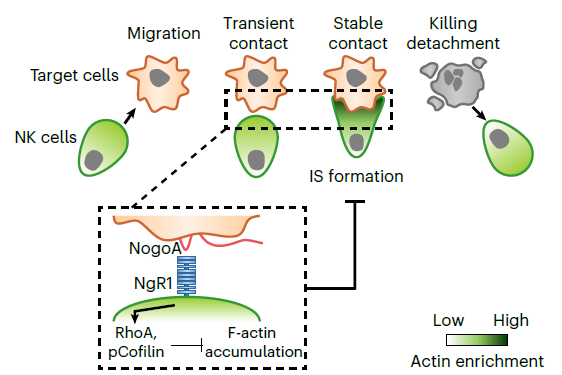Researchers in Korea said they discovered a new immune checkpoint inhibitor called NgR1 which suppresses the activity of natural killer (NK) cells in cancer.

Surgery, radiation therapy, and chemotherapy have been used as major treatments for cancer. However, many cancer patients suffer from physical and psychological pain from surgery, recurrence, and resistance to existing treatments.
Anti-cancer immunotherapy can treat cancer using immune cells such as NK cells or T cells of cancer patients.
When NK cells meet cancer cells, viruses, and bacteria, they create contacts to bind to infected cells, called immunological synapses (IS), and directly attack them. First, NK cells need to recognize target cells but some cancer cells can combine with immune checkpoints to protect themselves from attack by immune cells.
Immune checkpoint inhibitors are available but they may cause side effects such as immune-related adverse reactions.
The research team led by Professor Kim Tae-don of the Korea Research Institute of Bioscience and Biotechnology (KRIBB), discovered a new immune checkpoint, Nogo receptor1 (NgR1), which disrupts the formation of immunological synapses in NK cells and related mechanisms.

When NgR1 is blocked, NK cells have higher stability in forming immunological synapses than general NK cells, resulting in higher killing power to dissolve target cells.
Mice injected with NK cells with the NgR1 inhibitor showed lower cancer development and longer survival than regular mice. They also found that the greater the expression of the immunosuppressive NgR1 protein, the worse the prognosis.
"The research demonstrated the regulation mechanism of NK cell activity and integrates it with imaging techniques that analyze the stability of immunological synapse formation by Professor Do Jun-sang's team at Seoul National University," Professor Kim said.
"We hope that this newly revealed immune checkpoint will provide an understanding of the activity control of NK cells and create a new method for the development of anti-cancer immunotherapy drugs," he went on to say.
The study was published in the online edition of Nature Immunology on Monday.

